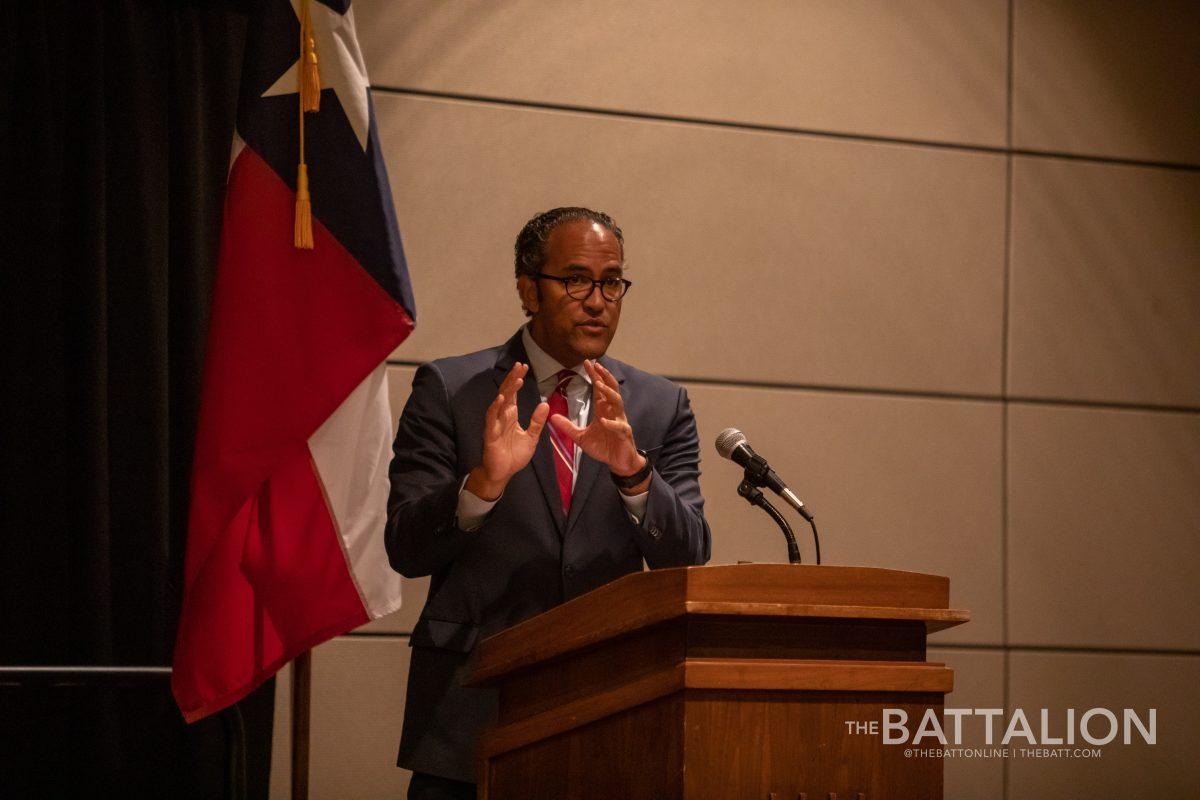As China may surpass the United States as a leading world superpower, former U.S. Rep. Will Hurd, Class of 2000, urged the U.S. government to step in to increase cybersecurity and protect its citizens.
Hosted by MSC Wiley Lecture Series, Hurd spoke on technology policy with featured discussions on emerging fields such as artificial intelligence, cybersecurity and quantum computing.
Hurd said the country’s current political issues will hinder its technological expansion if not addressed.
“[If we don’t] solve the political problems that we have, we’re not going to be able to address what I consider generational defining challenges that affect each and every one of us,” Hurd said. “We have to address this because the technology explosion that we’re going to see in the next 30 years is going to make the tech explosion in the last 30 years look insignificant. [If] we ignore the challenges the world’s gonna be left worse off. It’s going to be left to your children, your grandchildren worse off. We have to address these issues now.”
Despite being accepted to Stanford University, Hurd said he fell in love with A&M and eventually chose to attend the university to pursue his undergraduate degree. After a study abroad trip in Mexico, Hurd said he decided to minor in international studies, which piqued his interest in the CIA.
At 22 years old, Hurd said he started working for the CIA and spent time all over the world managing undercover operations.
“In addition to stopping terrorists [from] trying to blow up America and putting nuclear weapon proliferators out of business, my job was to brief members of Congress,” Hurd said. “I was pretty shocked by the caliber of our elected officials.”
Hurd said he believes there is a lack of leadership in Washington, D.C., on issues of cybersecurity. He said he wants to see America reboot itself to deal with the challenges and said the first step is finding leaders who are willing to inspire, not fear.
“U.S. economic and military dominance is no longer a guarantee,” Hurd said. “If we as a nation are going to continue to uplift humanity for another 50 years, we’re going to have to rebuild.”
Hurd claims the U.S. is in a new Cold War, as the Chinese Government has made a clear attempt to surpass America as a global superpower.
“We need a foreign policy,” Hurd said. “Our friends need to love us and our enemies need to fear us. That requires us to know who are our friends and who are our enemies, and sometimes we get that little mixed up.”
Hurd said the last five presidents of the United States have built a foreign policy on the same national insurance: a healthy and growing economy, a rules-based international order, the growth of free markets and a stable secure world.
“I think a new one needs to be added,” Hurd said. “It’s talked about, but it’s not in our national security document. [It should] preserve and extend the internet as a tool for increased productivity and exchange of ideas.”
Hurd said he believes in order to avoid another crisis such as COVID-19, the U.S. government must be able to detect threats.
“It starts by having leaders who are willing to inspire and not fear monger,” Hurd said. “It requires us to have a foreign policy where enemies fear us, and our friends love us. It means that we’re going to have to take advantage of technology before it takes advantage of us. If we’re gonna uplift humanity for another 250 years, we’ve got to remove this thing so we can deal with these problems.”
Chair of Wylie Lecture Series and agricultural economics senior Madison Baugh said she believes technology and policy are important to a lot of demographics at the school.
“I think that it was really good for us to put on a lecture like this,” Baugh said. “Having someone as prestigious as Mr. Hurd is [an] honor. It’s beneficial to students to attend lecture series, because [they] get to learn things from people who have experienced the real world, that [are] not just in academia.”
Member of the symposium subcommittee and political science junior Max Zhao said the Wiley Lecture Series often presents niche topics.
“I feel like exposing the general population to these kinds of specific topics, maybe it will interest more people into making that part of their real life goals,” Zhao said. “Hopefully, in the future, they end up being the ones that have an impact on the world as a result.”
Rebooting America
October 28, 2021
Photo by Photo by Robert O’Brien
Former Congressman Will Hurd gave a talk during an event hosted by MSC Wiley. The event was focused around issues pertaining to cyber security.
0
Donate to The Battalion
$1865
$5000
Contributed
Our Goal
Your donation will support the student journalists of Texas A&M University - College Station. Your contribution will allow us to purchase equipment and cover our annual website hosting costs, in addition to paying freelance staffers for their work, travel costs for coverage and more!
More to Discover










